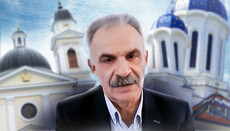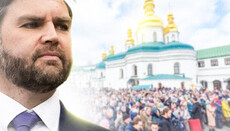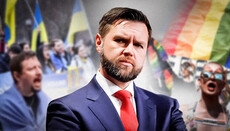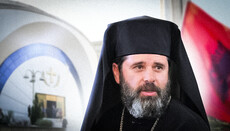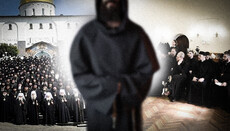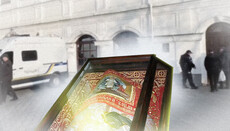OCU and UGCC call for peace in Donbass: tactical switch or peacekeeping?
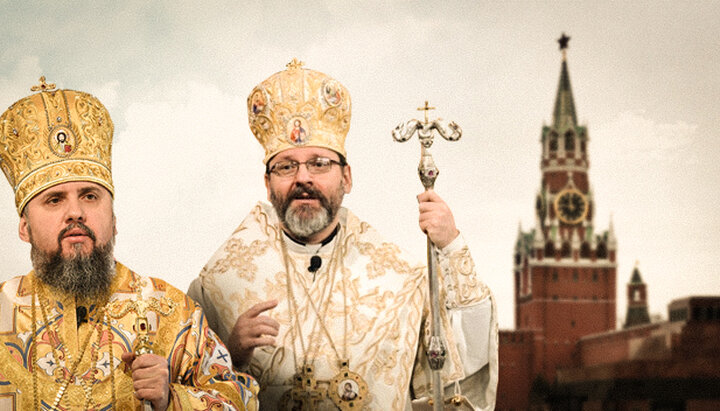
Some Uniates and schismatics who used to call for victory over the aggressor, suddenly spoke about peace with Russia. Is it all about peace or just a shift in tactics?
One of the most "thorny" topics tearing Ukrainian society apart is the nature of the conflict in Donbass. The Ukrainian Orthodox Church has always positioned it as a fratricidal war, consistently calling on the parties for peace, while the OCU and the UGCC – as Russia's war against Ukraine, calling on Ukrainians to fight to a victorious end. This end implies the expulsion of the Russian aggressor from the territory of Ukraine (DNR and LNR) and taking these lands under the control of the AFU.
Now, when the concentration of troops near the borders of Russia and Ukraine has reached its apogee and only the laziest do not speak about the beginning of the war, the leaders of the "patriotic" denominations of the OCU and UGCC also spoke out on the "military" topic. We will consider these statements today, as well as compare them with the position of the Ukrainian Orthodox Church.
OCU: The Russian Federation is an aggressor who only intends to attack
On April 19, 2021, the statement of the Synod of this organization "on the escalation of Russian aggression against Ukraine" was posted on the website of the OCU.
Before analyzing this document, it makes sense to give a definition of such a psychological phenomenon as cognitive dissonance. The founder of the theory of the same name, the American psychologist Leon Festinger, formulated it as follows: "Cognitive dissonance is a state of mental discomfort of an individual caused by a collision in his mind of conflicting ideas: ideas, beliefs, values or emotional reactions."
So, the Synod of the OCU claims in the title of its statement that the Russian aggression already exists, and at the moment it is escalating. But the first paragraph of the document contains the opposite statement: there is no aggression; there is only a cluster of troops who have not yet crossed the borders of Ukraine.
We read: “Numerous reliable reports confirm the largest concentration of Russian troops near our borders since the beginning of the undeclared war of Russia against Ukraine in 2014. The first and obvious goal of such a build-up is to intimidate Ukrainian society by the Kremlin, to put pressure on our state and on Ukraine's allies in the free world in order to achieve its own interests.”
Also, there is not a single word throughout the statement of the OCU about the fact that Russian troops are already on Ukrainian territory, as the "hierarchs" themselves and Ukrainian politicians of various ranks keep on ranting. The synodals of the OCU speak only of the intentions of the Russian side.
- “We are not afraid! Our response to another aggressive intention of the Russian authorities."
- "… compelled to remind again: your criminal intentions are known to God…"
Meanwhile, this contradicts the Law of Ukraine adopted in 2018: "On the peculiarities of state policy to ensure the state sovereignty of Ukraine in the temporarily occupied territories of Donetsk and Luhansk regions", the preamble of which reads: "The Russian Federation commits a crime of aggression against Ukraine and carries out temporary occupation of a part of its territory."
Therefore, according to the law, Russian troops are de facto on the territory of Ukraine and are already carrying out the occupation, whereas the Synod of the OCU still believes these are only intentions to intimidate. I think it is necessary to call on the Synod of the OCU to give an unequivocal answer: are there Russian troops in Ukraine or not?
According to the law, Russian troops are de facto on the territory of Ukraine, carrying out the occupation, while the Synod of the OCU still believes these are only intentions to intimidate.
The next statement of the synodals of the OCU is even more disturbing than cognitive dissonance. It is about human souls. Quote: "We will lay down our soul and body for our freedom" are not just words from the National Anthem of Ukraine. This belief is one of the key features of the Ukrainian political nation…" That is, these words are approved by the authority of the Synod of the OCU. But the Anthem of Ukraine is about political freedom, for the sake of which the "bishops" of the OCU offer people to give their immortal souls. Christ once spoke with the Pharisees about the difference between true freedom and political freedom. The Jews told Christ about political freedom and true freedom: “And you shall know the truth, and the truth shall make you free.” They answered Him, “We are Abraham’s descendants, and have never been in bondage to anyone. How can You say, ‘You will be made free’?” Jesus answered them, “Most assuredly, I say to you, whoever commits sin is a slave of sin” (John 8: 32-34).
Elsewhere, Christ makes it clear how useless it is for man to indulge in earthly matters: "For what will it profit a man if he gains the whole world and loses his own soul?" (Mark 8:36).
Both the Holy Scriptures and the holy fathers tell us that the human soul has the greatest value. “The soul is the core, meaning and purpose of visible creation. <…> There is nothing more precious than the soul ... <…> Nothing can compare with the soul, not even the whole world” (St. John Chrysostom). When politicians or nationalists claim that the soul can be given for political freedom is understandable and forgivable, but when it is declared by the people who call themselves pastors of Christians, it is directly contrary to the teachings of Jesus Christ and His entire mission on earth. The Lord did not come to give people political freedom, but to save them from the bondage of sin and death.
It is impossible to believe that the leadership of the OCU does not recognize Russia as an enemy and in fact calls for peace with its northern neighbor.
In addition, there is another "revelation" of the Synod of the OCU: "The Ukrainian people want to live in peace and harmony with everyone, especially with our historical neighbors." It is impossible to believe that the leadership of the OCU does not recognize Russia as an enemy and in fact calls for peace with its northern neighbor. Was that really voiced after all the calls for struggle, all the narratives that when it comes to peace, it has to be "fair", i.e. on our terms. Similar statements from the OCU are countless. Let's remember, for example, what Sergei Dumenko, said in September 2019: “Soon we will celebrate together the day when our aggressor, our northern neighbor, who is trying to enslave us physically, will be defeated… Thousands of human lives of the best sons and daughters are already laid on the altar of independence of our people. Therefore, may the Lord help us to move forward on the path of truth that will lead us to complete victory.”
In August 2020, Dumenko reiterated that the Ukrainians "should, first of all, think about winning an undeclared war," "fair peace", etc. Moreover, Epiphany asserted that thanks to those killed in the war with the aggressor, the OCU ensued: “Thousands of our glorious heroes have laid their lives on the altar of state independence. And thanks to their sacrifice, we received the autocephalous status and recognition of our Ukrainian Orthodox Church."
However, now the Synod of the OCU declares that it is necessary to live in peace and harmony with Russia. Nothing less than "fifth columnism"?
"No to war!" from the producer "We do not need peace at any cost!"
The interview of the head of the UGCC Sviatoslav Shevchuk to the Exaudi agency is abundant in no less surprising statements. The leader of the Ukrainian Catholics of the Orthodox rite is just a dove of peace: “We are convinced there is no military solution to the issue of Eastern Ukraine. There is only a diplomatic solution. Only dialogue can lead to reconciliation, but to begin this dialogue, an authentic pursuit of peace is needed. That is why we seek to awaken this desire, to nurture it, to make it, and we want the international community to be informed of our commitment to peace. No war! Put down your weapons! As the Holy Father Francis said, nothing can be achieved by war, but everything can be lost. Let reason, dialogue, and also diplomacy, prevail over the temptation to use weapons to solve any problems in international politics."
How can there be no military solution? What does it mean to lay down weapons? And what did Shevchuk's words, which he said on November 20, 2019 in an interview with the Left Bank, mean: "It is very dangerous when in such circumstances someone will talk about the need to end the war at any cost, neglecting truth and justice." > succumb to the aggressor for the so-called peace, that is, to raise their hands up. <…> If we surrender to the aggressor, we will allow this aggression at all levels of Ukrainian society, and this will call into question the very existence of the Ukrainian state and our people. I don't think anyone wants peace at such a price today."
What did his words from Sunday's sermon on September 29, 2019, in which he claimed that "only those are tired of the war that constantly care about how to save their skin", mean?
What did he mean in June 2019 when he said that "without a doubt, war cannot end in peace at any cost", that "if now the word" peace "means peace at any cost – accepting the aggressor’s terms – then the very notion of peace as such is false"?
At the backdrop of all those belligerent narratives, "there can be no military solution" now? But to whom are the words “No to war! Lay down your weapons!” addressed – to all parties to the conflict or only to the representatives of the unrecognized DNR and LNR?
There is also the above-mentioned cognitive dissonance in the interview, in which Sviatoslav Shevchuk states, "Due to the very high concentration of Russian units on the Ukrainian border, there are fears of a direct invasion of these troops into the territory of Ukraine."
So are Russian troops only concentrating on the border or have they already invaded Ukraine? An interesting point: there is a dispute about the presence of Russian troops in the Donbass, Russia stubbornly denies it and asks for evidence, but there is no dispute at all about Russian troops in the Crimea. Russia considers Crimea its territory and quite openly keeps its ground forces and navy there. But for Sviatoslav Shevchuk and Sergei (Epiphany) Dumenko Crimea, in theory, should be Ukrainian territory. Why do they call the troops there "units on the Ukrainian border"? What is this border given that it is the territory of Ukraine?
Why did the hawks of war become doves of peace?
One may ask the question: what made the leaders of the OCU and the UGCC change their opinion so drastically and move from belligerent rhetoric to calls for peace?
Perhaps Sviatoslav Shevchuk was so affected by the words of Pope Francis, who said in his Easter message: "I am following with concern the events in some territories of eastern Ukraine, where the number of ceasefire violations has increased in recent months, and I am watching the growth of military activity with anxiety. <…> "I urge you to prevent the escalation of tensions, so that, on the contrary, gestures can be made that can maintain mutual trust and promote reconciliation and peace, which are very necessary and very desirable"?
Perhaps the Russian troops impressed the members of the Synod of the OCU so much indeed that they suddenly declared their desire to "live in peace and harmony with everyone, first and foremost, with our historical neighbors."
Or maybe it's all about the belief that religious organizations must meet the demands of society? Requests have changed – and so have the opinion? Or is it all about the audience? For the domestic consumer, who is mainly Ukrainian national radicals, the leaders of the OCU and the UGCC are hawks who incite "patriotic" feelings, but in fact – hatred for Donbass and its inhabitants. But for the external recipient, they are the doves of peace, calling for love and harmony.
In fact, the answer to this question is not so important. There is another important thing: whereas politicians can shift their ground every time circumstances change, then such “ground-shifting” for religious leaders is out of place. If a person who calls himself a shepherd says one thing today and another thing tomorrow, how can he be trusted at all? "He is double-minded man, unstable in all his ways" (James 1: 8).
Whereas politicians can shift their ground every time circumstances change, then such “ground-shifting” for religious leaders is out of place.
About the position of the Ukrainian Orthodox Church on the conflict in Donbass
And now let us recall the statements of the Primate of the UOC, Metropolitan Onuphry, and other hierarchs about the conflict in eastern Ukraine. No one has ever heard any hate speech from them, since they have never made any belligerent statements. From the very beginning of the conflict, they exhorted to peace and an end to hostilities. Let us recall how His Beatitude Onuphry and other representatives of the UOC did not rise from their seats at the Verkhovna Rada sitting on May 8, 2015, when President Poroshenko read out the names of servicemen who received the title of Heroes of Ukraine during the hostilities in Donbass. Then a barrage of indignation fell on the head of the Primate of the Ukrainian Orthodox Church, and he declared in this connection: “We did not stand up, because it was our sign of protest against the war as a phenomenon. We do not want the war to continue on our land. We don't want people to kill each other. We want peace and God's blessing on our earth.”
Let's remember how Bishop Victor (Kotsaba), who was an archimandrite then, said in 2015 that the Church is always above ideological and political convictions, that Her task is prayer, a call to love and consent: “The Church cannot side with any one part of society, because in that case it ceases to be the Church. She must do everything to make the people who quarreled reconcile. This is the main task of the Church." Let us recall how, having already become a bishop and a head of the Representation of the UOC to European International Organizations, he repeatedly called for peace and sought the help from international organizations along the way.
"Ukraine needs peace – this is what we must strive for together. The armed confrontation has already claimed thousands of lives, and any death in the JFO is the pain and tears of mothers, wives and children. The mission of the Church in such a situation is to call for peace and an end to the war."
Here are the words of Metropolitan Anthony (Pakanich), the Chancellorof the UOC, spoken by him during the Great Lent in 2015: “This year Lent is special for us. After all, we went through a very difficult year. Political confrontation escalated into bloodshed. And now, thank God, there are fragile hopes for peace. As believers, we must repent, overcome the spirit of aggression and bigotry. Then, perhaps, God will help us to achieve peace."
Here are his words, said a few days ago: “Lent is a time of testing of spiritual strength and will. It is also a period of rethinking our lives, forgiving each other, fulfilling charity, and trying to fix what has long been tearing our hearts apart. "Increased shelling and, as a result, human toll, numerous ceasefire violations, the afflictions of civilians – all this causes great pain and a great desire for peace to finally settle in this long-suffering land."
There is no man who is not guilty before God. Does the Lord forgive us? He does. So forgive each other, as God forgives us. This is our principle, according to which we seek the release of our prisoners of war.
His Beatitude Onuphry
A separate topic is the efforts of the UOC to release prisoners of war. Thanks to these efforts, at the end of 2017, more than 300 people from both sides of the conflict were able to return home to their near ones. All of them (!) are citizens of Ukraine with Ukrainian passports. Here is what His Beatitude Metropolitan Onuphry said at the time, “The exchange of prisoners is the first step towards ending the war in Donbass ... The Church works only in the sphere of mercy; if there is no mercy, we will not have any success. We must forgive each other, and this will vouch for the release of prisoners and return to their families and arrival of peace to our state ..."
Here are his words, said by His Beatitude in 2019: “Our Church has been dealing with the issue of the release of prisoners of war for several years ... We do not go into legal nitty-gritty as to who is guilty and to whom, we say like this: we all live before God, and everyone is guilty before God – there is no person who is not guilty before God. Does the Lord forgive us? He does. So forgive each other, as God forgives us. This is our principle, according to which we seek the release of our prisoners of war."
It is said that the reader remembers best the most recent thesis read. Therefore, let us dwell on this appeal of the Primate of the UOC: "Forgive each other, as God forgives us." This appeal is constantly made by His Beatitude Onuphry, and it is not subject to ground-shifting or double-crossing. This is because the Gospel is immutable, and anyone who truly preaches Christ cannot change his beliefs.
